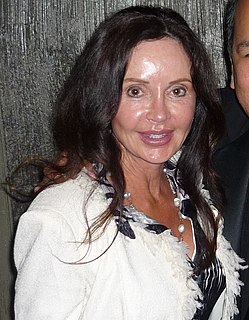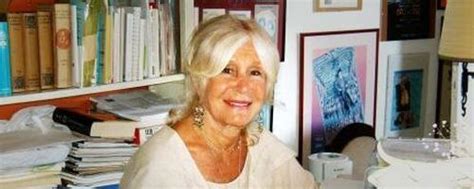A Quote by Margaret Atwood
Things might have been different if she hadn't been able to drift; if she'd had to concentrate on her next meal, instead of dwelling on all the injuries she felt we'd done her. An unearned income encourages self-pity in those already prone to it.
Related Quotes
From an early age she had developed the art of being alone and generally preferred her own company to anyone else’s. She read books at enormous speed and judged them entirely on her ability to remove her from her material surroundings. In almost all the unhappiest days of her life she had been able to escape from her own inner world by living temporarily in someone else’s, and on the two or three occasions that she had been too upset to concentrate she had been desolate.
We might have been ready to offer sympathy, but in actuality there were stronger reasons to want to congratulate her for having found such a powerful motive to feel sad. We should have envied her for having located someone without whom she so firmly felt she could not survive, beyond the gate let along in a bare student bedroom in a suburb of Rio. If she had been able to view her situation from a sufficient distance, she might have been able to recognise this as one of the high points in her life.
In this moment she felt that she had been robbed of an enormous number of valuable things, whether material or intangible: things lost or broken by her own fault, things she had forgotten and left in houses when she moved: books borrowed from her and not returned, journeys she had planned and had not made, words she had waited to hear spoken to her and had not heard, and the words she meant to answer with. . . .
At that moment a very good thing was happening to her. Four good things had happened to her, in fact, since she came to Misselthwaite Manor. She had felt as if she had understood a robin and that he had understood her; she had run in the wind until her blood had grown warm; she had been healthily hungry for the first time in her life; and she had found out what it was to be sorry for someone.
Sarah Brown is a sweetie to work with. She's a good actress. She's gutsy and she comes in and she knows her lines. She's just terrific. Sometimes I forget how young she is, because she truly walked right in and took the territory and was able to hold her own with people who've been here for so many years. To be able to pull that off [for someone who had never been on a show], I really give the woman a lot of credit. She's done great.
As she had been walking from the ward to that room, she had felt such pure hatred that now she had no more rancor left in her heart. She had finally allowed her negative feelings to surface, feelings that had been repressed for years in her soul. She had actually FELT them, and they were no longer necessary, they could leave.
She rested her head against his and felt, for the first time, what she would often feel with him: a self-affection. He made her like herself. With him, she was at ease; her skin felt as though it was her right size.. It seemed so natural, to talk to him about odd things. She had never done that before. The trust, so sudden and yet so complete, and the intimacy, frightened her.. But now she could think only of all the things she yet wanted to tell him, wanted to do with him.
The pain was as unexpected as a thunderclap in a clear sky. Eddis's chest tightened, as something closed around her heart. A deep breath might have calmed her, but she couldn't draw one. She wondered if she was ill, and she even thought briefly that she might have been poisoned. She felt Attolia reach out and take her hand. To the court it was unexceptional, hardly noticed, but to Eddis it was an anchor, and she held on to it as if to a lifeline. Sounis was looking at her with concern. Her responding smile was artificial.
She had always been a reader… but now she was obsessed. Since her discovery of the book hoard downstairs from her job, she’d been caught up in one such collection of people and their doings after the next…The pleasure of this sort of life – bookish, she supposed it might be called, a reading life – had made her isolation into a rich and even subversive thing. She inhabited one consoling or horrifying persona after another…That she was childless and husbandless and poor meant less once she picked up a book. Her mistakes disappeared into it. She lived with an invented force.
That was the dirty secret associated with her past. Not that she'd been abused but that somehow she felt that she deserved it because she'd let it happen. Even now, it shamed her, and there were times when she felt hideously ugly, as though the scars that had been left behind were visible to everyone.
It seemed to Alabama that, reaching her goal, she would drive the devils that had driven her - that, in proving herself, she would achieve that peace which she imagined went only in surety of one’s self - that she would be able, through the medium of the dance, to command her emotions, to summon love or pity or happiness at will, having provided a channel through which they might flow. She drove herself mercilessly, and the summer dragged on.
Occasionally, on screen, Barbara [Stanwyck] had a wary, watchful quality about her that I've noticed in other people who had bad childhoods; they tend to keep an eye on life because they don't think it can be trusted. After her mother was killed by a streetcar, she had been raised in Brooklyn by her sisters, and from things she said, I believe she had been abused as a child. She had lived an entirely different life than mine, that's for sure, which is one reason I found her so fascinating. I think her early life was one reason she had such authenticity as an actress, and as a person.
Because no, I didn’t push her away. I didn’t add to her pain or do anything to hurt her. Instead, I left her alone in that room. The only person who might’ve been able to reach out and save her from herself. To pull her back from wherever she was heading. I did what she asked and I left. When I should have stayed.
I love Elizabeth Taylor. I'm inspired by her bravery. She has been through so much and she is a survivor. That lady has been through a lot and she's walked out of it on two feet. I identify with her very strongly because of our experiences as child stars. When we first started talking on the phone, she told me she felt as if she had known me for years. I felt the same way.



































